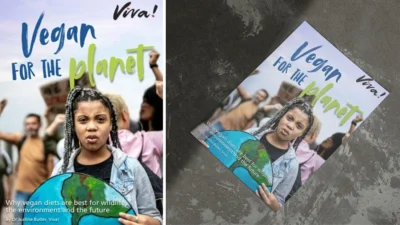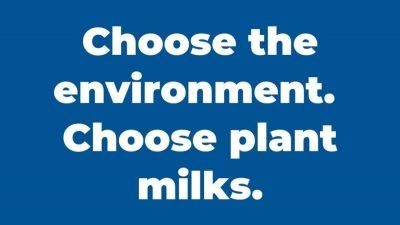Tall stories in the press

This week, The Times ran a story “The vegan staples that are bad for the planet” suggesting vegan bacon and almond milk both have a greater carbon footprint than their meaty and milky equivalents. What a load of tosh!
The new study this tall story was based on compared 24 meat and milk alternatives looking at nutritional, health and environmental impacts. Firstly, they compared a typical serving size of each food, for example, comparing a glass of soya, oat, rice or almond milk with a glass of cow’s milk. Plant milks won on all counts.
But not all vegan alternatives contain the same amount of calories. So, for the sake of fairness, Oxford University researcher Dr Marco Springmann, also compared the environmental impacts of foods based on the different amount of each one required to make up the same number of calories. Because almond milk contains less calories than cow’s, oat and soya milks, a comparison based on calories meant comparing four glasses of almond milk with just one glass of cow’s milk. Almonds are relatively thirsty compared to soya and oat milk (but not cow’s milk), so while one serving of almond milk requires less water than one of cow’s milk, four servings requires more. But no one drinks four times as much milk on their cereal or in their tea because it contains less calories, so to run with this was misleading and as slippery as butter!
The suggestion that vegan bacon has a worse score than pork bacon was even more tenuous and appeared to be based solely on cost, even though vegan bacon scored better on all other counts. The reason pork bacon is cheaper is because most pigs in the UK are confined in industrial-sized factory farms for their miserable short lives!
The Times story completely ignored the study’s conclusions: “Our findings suggest that unprocessed plant-based foods, such as soybeans, peas, and beans are best suited for replacing meat and dairy in high-income countries, and performed well on all dimensions. In comparison, processed plant-based foods such as veggie burgers and plant milks were associated with less climate benefits and greater costs than unprocessed foods, but still offered substantial environmental, health, and nutritional benefits compared to animal-source foods.”
Viva! reached out to Dr Springmann to get his reaction to The Times story, he said: “Unfortunately, The Times heavily misrepresented the study. Our official press release clearly notes that any plant-based alternative is better than the meat and milk product they aim to replace, and that unprocessed alternatives perform relatively better than the processed ones.”
Both Dr Springmann and Viva! have contacted The Times’ health editor but had no reply. It seems they have an agenda of their own based on bias rather than evidence.







